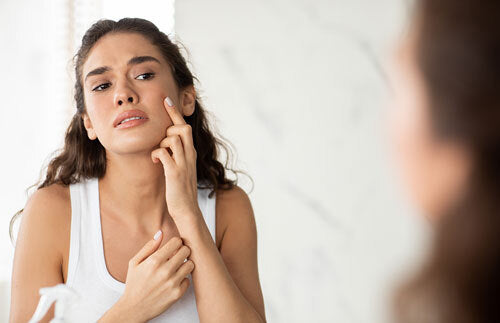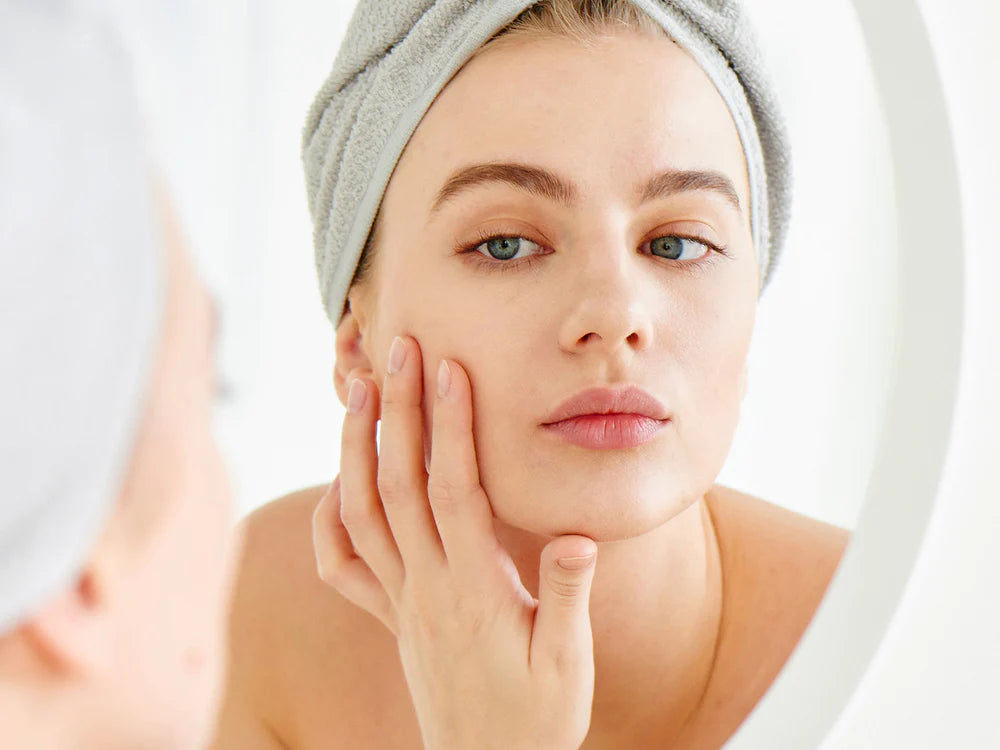
Popping Pimples: Navigating the World of Pimple Popping
The allure of popping a pimple is a temptation that many have succumbed to in the pursuit of smoother, clearer skin. It's a seemingly quick solution, promising instant relief from the unsightly blemish. However, beneath the surface, there lies a delicate balance between achieving that gratifying "pop" and inviting a host of potential issues.
How to Correctly Pop a Pimple
It's generally advisable to avoid popping pimples, as it can lead to inflammation, scarring, and the spread of bacteria. However, if you feel the need to address a pimple that has come to a head and is ready to pop, it's essential to do it in a way that minimizes damage and reduces the risk of infection. Here's a step-by-step guide on how to correctly pop a pimple:
- Prepare Your Skin: Wash your hands thoroughly with soap and water to reduce the risk of introducing bacteria to the pimple. Cleanse your face with a mild, fragrance-free cleanser.
- Sterilize Tools: If you choose to use tools, sterilize a needle or pin with rubbing alcohol. Avoid using your fingers, as they may introduce more bacteria.
- Apply a Warm Compress: Soak a clean cloth in warm water and place it on the pimple for 5-10 minutes. This helps soften the skin and makes the pimple easier to extract.
- Use a Sterile Needle or Pin: If you decide to use a needle, gently pierce the pimple's surface from one side. Do not puncture it from the top, as this can push bacteria further into the skin.
- Gently Squeeze: Using clean cotton swabs or tissue, apply gentle pressure to the sides of the pimple. Press down and then upward to encourage the pus to come out. Stop if you encounter resistance or significant pain.
- Clean the Area: Once the pus is expelled, clean the area with an alcohol-soaked cotton pad to disinfect it. Avoid using excessive force, as this can lead to more inflammation.
- Avoid Aggravating Products: Avoid applying harsh skincare products or makeup to the area immediately after popping the pimple. Let the skin heal naturally.
- Hands Off: Refrain from touching the popped pimple with your hands to prevent the introduction of more bacteria. Let the skin heal on its own.
- Apply a Cold Compress: If there is redness or swelling, apply a cold compress to reduce inflammation.
- Follow-up: Keep an eye on the area and make sure it heals without signs of infection.
Remember, it's always safer to allow pimples to heal naturally.
Types of Pimples to Pop
- Popping a blackhead
While it's generally advised to avoid manipulating the skin, if you're set on popping a blackhead, proceed with caution. Begin by cleansing your face and applying a warm compress to open up pores. Sanitize a blackhead extractor tool if used, and gently apply even pressure around the blackhead. If it doesn't yield easily, refrain from forcing it to prevent irritation. Post-extraction, cleanse the area and apply an over-the-counter antibiotic ointment. Prioritize cleanliness and avoid aggressive techniques to promote a healthy healing process. If uncertain, seeking professional advice is the safer option.
- Popping a whitehead
While it's generally best to let whiteheads heal naturally if you choose to pop one, proceed with caution. Cleanse your face and use a warm compress to open pores. Sanitize a needle if needed, gently pierce the whitehead, and apply even pressure for extraction. Stop if it's resistant. Cleanse the area and apply an antibiotic ointment afterward. Prioritize cleanliness and avoid excessive force to prevent complications.
- Popping a pustule
While it's best to let pustules heal naturally if you opt to extract one, proceed with care. Cleanse your face, use a warm compress to open pores, and, if necessary, sanitize a needle. Gently pierce the pustule from the side, avoiding the top, and apply even pressure for extraction, stopping if it resists. Post-extraction, cleanse the area and apply an antibiotic ointment. Prioritize cleanliness, avoid excessive force, and consider professional advice if uncertain or uncomfortable.
- Popping a cyst
It's strongly advised to avoid popping cystic acne due to the risk of severe inflammation, scarring, and increased infection. Cystic acne is deeply embedded in the skin, and attempting to pop it can worsen the condition. Instead, focus on a gentle skincare routine involving cleansing with a mild, fragrance-free cleanser, and consider consulting a dermatologist for appropriate treatment options, such as prescription medications or professional interventions. Trying to extract cystic acne at home can lead to more significant issues and may not effectively address the underlying causes. Prioritize professional guidance for the best outcomes and to minimize potential complications.

Risks of Popping a Pimple
Popping a pimple may seem like a quick fix, but it carries several risks and can potentially worsen the situation. Here are the risks associated with popping a pimple:
- Infection: Breaking the skin barrier during the popping process increases the risk of introducing bacteria from your hands or surrounding environment into the pimple, leading to infection. Infected pimples can be painful, and swollen, and may require medical attention.
- Inflammation: Popping a pimple can cause inflammation, making the surrounding area red and swollen. This inflammation can be more severe than the initial pimple and may take longer to heal.
- Scarring: Picking or squeezing a pimple can damage the skin tissue, leading to scarring. Post-inflammatory hyperpigmentation or depressed scars may develop, and these can be challenging to treat.
- Spread of Bacteria: Pimple contents, including pus and bacteria, can spread to surrounding pores and cause new breakouts. This is known as "autoinoculation" and can lead to the development of more pimples in the same area.
- Delayed Healing: Popping a pimple disrupts the natural healing process. It may take longer for the pimple to heal, and the risk of complications, such as infection or scarring, increases.
- Increased Redness and Swelling: Aggressive squeezing or picking can cause trauma to the blood vessels and tissues, leading to increased redness and swelling in the affected area.
- Risk of Underlying Damage: If the pimple is not ready to be popped or if the process is not done correctly, you can cause more damage to the skin, potentially pushing the infection deeper.
- Pain and Discomfort: Popping a pimple can be painful, especially if done forcefully or if the pimple is not ready to be extracted. Pain and discomfort can persist during the healing process.
How to Prevent Your Next Pimple
Preventing pimples involves adopting a comprehensive skincare routine and making lifestyle adjustments. Here are some tips to help prevent the occurrence of future pimples:
- Cleanse Regularly: Wash your face twice daily with a mild, fragrance-free cleanser to remove excess oil, dirt, and bacteria. Use lukewarm water to avoid excessive drying of the skin.
- Use Non-Comedogenic Products: Choose skincare and makeup products labeled "non-comedogenic" to prevent pore blockages.
- Exfoliate Regularly: Incorporate exfoliation into your routine 2-3 times per week to remove dead skin cells. Use a gentle exfoliating scrub or a product containing alpha or beta hydroxy acids.
- Moisturize: Use a lightweight, oil-free, and non-comedogenic moisturizer to keep your skin hydrated without clogging pores.
- Hands Off: Avoid touching your face, as this can transfer bacteria from your hands to your skin and exacerbate pimples.
- Limit Sun Exposure: Use sunscreen with at least SPF 30 to protect your skin from harmful UV rays. Sun damage can worsen acne and cause inflammation.
- Healthy Diet: Maintain a balanced diet rich in fruits, vegetables, whole grains, and lean proteins. Limit the intake of sugary and greasy foods, as they may contribute to acne.
- Stay Hydrated: Drink plenty of water to keep your skin hydrated and promote overall skin health.
- Manage Stress: Practice stress-reducing activities such as meditation, deep breathing, or yoga. Stress can contribute to hormonal fluctuations that may trigger acne.
- Regular Exercise: Engage in regular physical activity to improve blood circulation and help regulate hormones. Shower promptly after sweating to prevent pore blockages.
- Change Bedding Regularly: Change pillowcases and sheets regularly to prevent the buildup of bacteria that can contribute to pimples.
- Avoid Overwashing: Overwashing your face can strip away natural oils and lead to increased oil production. Stick to a twice-daily cleansing routine.
- Limit Dairy Intake: Some studies suggest a link between dairy consumption and acne. Consider reducing dairy intake and observe if it has an impact on your skin.
- Be Gentle with Your Skin: Avoid harsh scrubbing and aggressive skincare routines, as these can irritate the skin and worsen acne.
- Do Not Pick or Squeeze: Resist the urge to pick or squeeze pimples, as this can lead to inflammation, scarring, and the spread of bacteria.
Consistency is key when it comes to preventing pimples. Implementing these tips into your daily routine and being mindful of your skincare habits can contribute to clearer and healthier skin over time.






